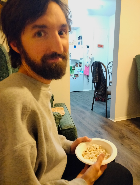William Blake Poem by Ian (John) McCleary (Son of the Cleric)
William Blake
When I think of what the poet William Blake said about Jesus being the equivalent of the human imagination, I think it began well but ended up showing itself to be the imagination of Blake, for better or worse depending on how you look at it.
It was really a scattering of different personal beliefs he had mashed in with his own visionary experiences.
Blake had a liberated view of human sexuality and this he made very apparent in his poems. A lot of his drawings of men and women celebrate the naked body.
Blake was said to have believed that marriage was anti nature, in which it denied people of their forbidden desires. He also was known to have shunned chastity as a virtue seeing no reason why people should hold it so high in esteem.
Another thing about
Blake was that he was known for having very intense hallucinatory visions which although a great source for his creativity also troubled him and effected his behavior.
This is not to undermine the creativity of his poems and paintings. But it also was a sign of mental illness which no one understood very much about in the time he was from.
The reason I think of Blake is because of my old approach to art. I don't follow where my imagination takes me anymore because of me knowing now, however difficult the truth may be, that my imagination is of the devil at the same time as it is of God. That it lost It's own immortality when it chose sin.
Blake starts by giving advice to the youth of delight of not being led astray by the blind in his Songs of Innocence, to writing his Proverbs of Hell which flips Christian morality on it's head with the most quoted line 'The road to excess is the palace of wisdom'. Which actually is not wisdom but foolishness. So at first he warns about folly but then in later poems encourages it.
This poem has not been translated into any other language yet.
I would like to translate this poem